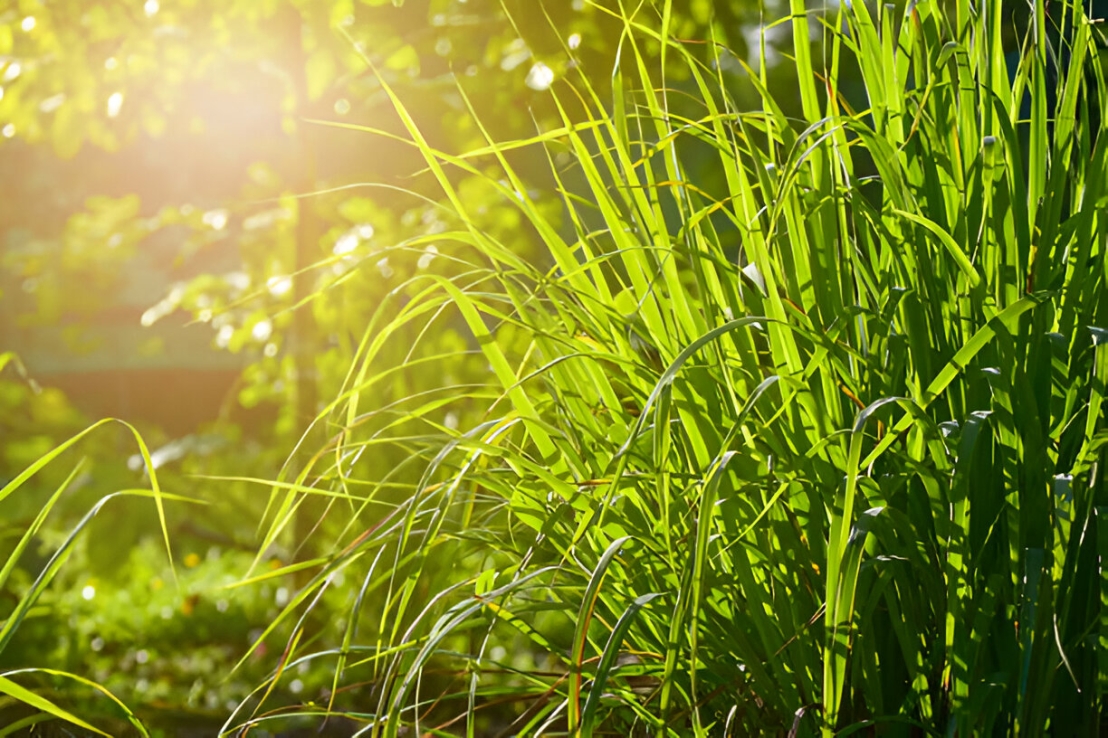Lemongrass (Cymbopogon)

Scientific Classification
- Kingdom: Plantae
- Clade: Tracheophytes
- Clade: Angiosperms
- Clade: Monocots
- Clade: Commelinids
- Order: Poales
- Family: Poaceae
- Subfamily: Panicoideae
- Genus: Cymbopogon
- Type Species: Cymbopogon schoenanthus
Morphology and Growth Habit
Lemongrass is a fast-growing, clumping grass that can reach heights of 3 to 6 feet (1-2 meters). It has long, thin, and sharp-edged green leaves with a strong citrus fragrance. The plant develops fibrous roots and grows best in well-drained, fertile soil under warm and humid conditions.
Leaf Structure
- Long, slender leaves (up to 1 meter in length)
- Sharp-edged, rough-textured surface
- Strong lemon scent due to high essential oil content
Flowers & Reproduction
- Small, inconspicuous flowers
- Propagated mainly through division rather than seeds
- Can flower under tropical conditions but rarely sets viable seeds
Types of Lemongrass
There are over 50 species of Cymbopogon, but the most widely cultivated varieties include:
1. West Indian Lemongrass (Cymbopogon citratus)
- Most commonly used in cooking
- Native to Southeast Asia
- Produces high-quality essential oil
2. East Indian Lemongrass (Cymbopogon flexuosus)
- Native to India and Sri Lanka
- Contains more citral, making it ideal for essential oil production
3. Citronella Grass (Cymbopogon nardus & Cymbopogon winterianus)
- Used in natural insect repellents
- Produces citronella oil, widely used in aromatherapy and household products
Culinary Uses of Lemongrass
Lemongrass is a staple herb in Asian, Caribbean, and African cuisines, providing a citrusy flavor to various dishes.
Popular Culinary Applications
✅ Soups & Broths (e.g., Thai Tom Yum)
✅ Curries & Stir-Fries
✅ Herbal Teas & Infusions
✅ Marinades for Meat & Seafood
✅ Desserts & Baked Goods
Medicinal Benefits & Traditional Uses
Lemongrass has been widely used in traditional medicine for centuries due to its anti-inflammatory, antifungal, and antimicrobial properties.
Health Benefits
? Digestive Aid – Helps relieve bloating, indigestion, and stomach cramps
? Stress Reliever – Used in herbal teas for relaxation
? Antibacterial Properties – Fights infections and supports immune function
? Detoxification – Known for its diuretic properties
? Pain Relief – Used in massage oils to relieve muscle pain
⚠️ Caution: Excessive consumption of lemongrass tea may cause allergic reactions or gastrointestinal discomfort.
Industrial & Commercial Uses
Lemongrass is widely used in cosmetics, aromatherapy, and insect repellents due to its strong citrus scent and medicinal properties.
Common Industrial Uses
✅ Essential Oils – Used in perfumes, candles, and diffusers
✅ Insect Repellent – Citronella oil is effective against mosquitoes
✅ Herbal Skincare – Found in soaps, lotions, and shampoos
How to Grow Lemongrass
Lemongrass is a low-maintenance plant that thrives in warm climates and well-draining soil.
Planting Guide
? Soil Type: Well-drained, sandy or loamy soil
☀️ Sunlight: Full sun (at least 6-8 hours per day)
? Watering: Regular watering but avoid waterlogging
?️ Temperature: Prefers warm temperatures (20-30°C / 68-86°F)
✂️ Pruning: Trim old leaves regularly to encourage new growth
Propagation
✅ By Division: Separate clumps and replant
✅ By Cuttings: Root fresh stalks in water before planting in soil
Harvesting & Storage
Lemongrass can be harvested once it reaches a height of 3 feet (1 meter). The lower stalks are the most flavorful and aromatic.
Harvesting Tips
? Cut stalks at the base using sharp scissors
? Harvest only mature stalks for the best flavor
? Use fresh, dried, or frozen lemongrass for long-term storage
Pests & Diseases
Lemongrass is relatively resistant to pests, but it may occasionally suffer from:
? Common Pests:
✔ Aphids
✔ Spider mites
✔ Leaf miners
? Common Diseases:
✔ Root rot (due to overwatering)
✔ Leaf blight
Is Lemongrass Safe?
✅ GRAS (Generally Recognized as Safe) by the FDA
✅ Non-toxic to humans and pets when used in moderation
⚠️ Potential Allergies: Some individuals may develop skin irritation from lemongrass oil

Comments : 0